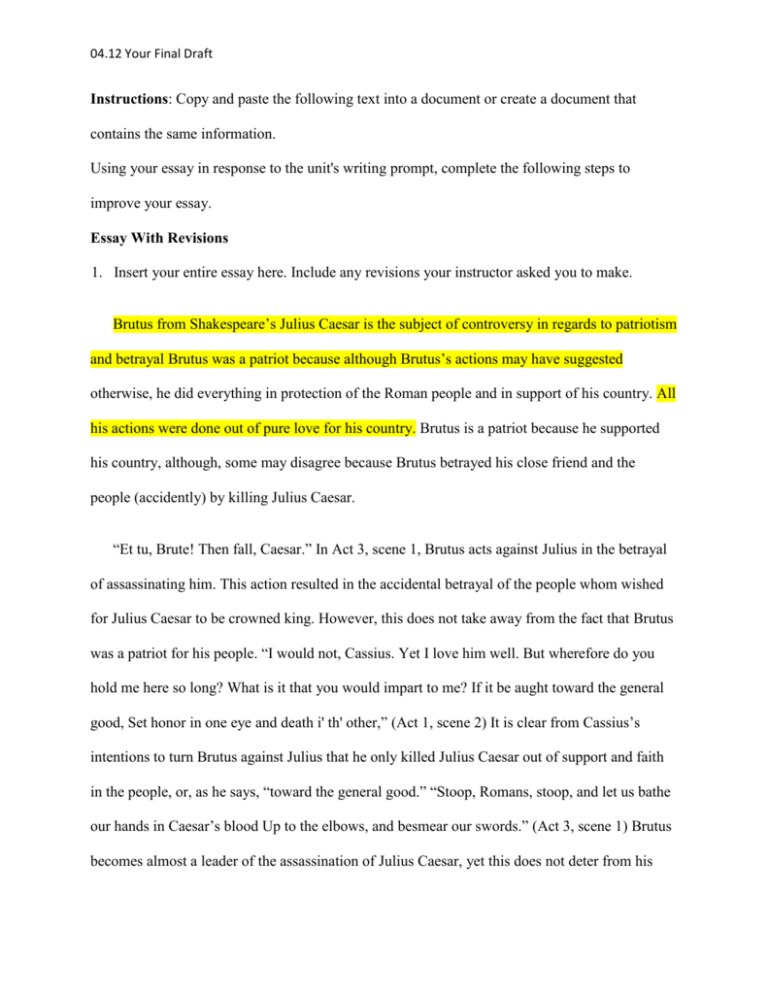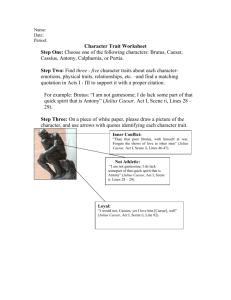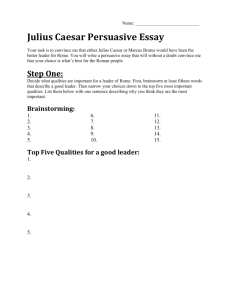04.12 Your Final Draft Instructions: Copy and paste the following text
advertisement

04.12 Your Final Draft Instructions: Copy and paste the following text into a document or create a document that contains the same information. Using your essay in response to the unit's writing prompt, complete the following steps to improve your essay. Essay With Revisions 1. Insert your entire essay here. Include any revisions your instructor asked you to make. Brutus from Shakespeare’s Julius Caesar is the subject of controversy in regards to patriotism and betrayal Brutus was a patriot because although Brutus’s actions may have suggested otherwise, he did everything in protection of the Roman people and in support of his country. All his actions were done out of pure love for his country. Brutus is a patriot because he supported his country, although, some may disagree because Brutus betrayed his close friend and the people (accidently) by killing Julius Caesar. “Et tu, Brute! Then fall, Caesar.” In Act 3, scene 1, Brutus acts against Julius in the betrayal of assassinating him. This action resulted in the accidental betrayal of the people whom wished for Julius Caesar to be crowned king. However, this does not take away from the fact that Brutus was a patriot for his people. “I would not, Cassius. Yet I love him well. But wherefore do you hold me here so long? What is it that you would impart to me? If it be aught toward the general good, Set honor in one eye and death i' th' other,” (Act 1, scene 2) It is clear from Cassius’s intentions to turn Brutus against Julius that he only killed Julius Caesar out of support and faith in the people, or, as he says, “toward the general good.” “Stoop, Romans, stoop, and let us bathe our hands in Caesar’s blood Up to the elbows, and besmear our swords.” (Act 3, scene 1) Brutus becomes almost a leader of the assassination of Julius Caesar, yet this does not deter from his 04.12 Your Final Draft love for Rome and the people of it. Although, by killing Julius, he did betray the people whom wished for Julius to be crowned king. It is in that way that he may be considered a betrayer. On the other hand, the definition of patriotism is “love of country and willingness to sacrifice for it.” (Dictionary.com) Several things that Brutus says points out the love that he had for his country. Brutus was a patriot, and a close friend of Julius. He declares his love for him, but under the impression that the people of Rome would be better without him crowned as king, he takes the initiative to put aside his love for Julius and kill him. “If it be aught toward the general good, Set honor in one eye and death i' th' other.” Brutus sacrificed his friendship with Julius Caesar for the good of Rome. Brutus considers his actions to be deemed “full of good regard”. His intentions of serving the good of the people are demonstrated through this: “Or else were this savage spectacle; our reasons are so full of good regard that were you, Anthony, the son of Caesar, you should be satisfied.” (Act 3, Scene 1) Moreover, an example of Brutus showing his good faith in the people is his speech. “Romans, countrymen, and lovers! Hear me for my cause, and be silent that you may hear. Believe me for mine honor, and have respect to mine honor that you may believe.” (Act 3, Scene 2) When pleading his case to the people of Rome, he brings up his honor. He believed that his actions were respectable because of the intentions behind it. To conclude, Brutus was a patriot. He did betray the people of Rome, and his good friend Julius. However, these actions were done when he thought that he was being supportive of his country. Therefore, it could be seen that Brutus was both a patriot and a betrayer of sorts. Grammar 2. Check your essay for grammatical errors. Highlight or underline any parts of your essay that should be corrected. 04.12 Your Final Draft 3. Correct the grammatical errors you identified and place your revisions here. Brutus from Shakespeare’s Julius Caesar is the subject of controversy in regards to patriotism and betrayal. Brutus was a patriot because although Brutus’s actions may have suggested otherwise, he did everything in protection of the Roman people and in support of his country. All of his actions were done out of pure love for his country. Brutus is a patriot because he supported his country, although, some may disagree because Brutus betrayed his close friend and the people (accidently) by killing Julius Caesar. “Et tu, Brute! Then fall, Caesar.” In Act 3, scene 1, Brutus acts against Julius in the betrayal of assassinating him. This action resulted in the accidental betrayal of the people whom wished for Julius Caesar to be crowned king. However, this does not take away from the fact that Brutus was a patriot for his people. “I would not, Cassius. Yet I love him well. But wherefore do you hold me here so long? What is it that you would impart to me? If it be aught toward the general good, Set honor in one eye and death i' th' other,” (Act 1, scene 2) It is clear from Cassius’s intentions to turn Brutus against Julius that he only killed Julius Caesar out of support and faith in the people, or, as he says, “toward the general good.” “Stoop, Romans, stoop, and let us bathe our hands in Caesar’s blood Up to the elbows, and besmear our swords.” (Act 3, scene 1) Brutus becomes almost a leader of the assassination of Julius Caesar, yet this does not deter from his love for Rome and the people of it. Although, by killing Julius, he did betray the people whom wished for Julius to be crowned king. It is in that way that he may be considered a betrayer. On the other hand, the definition of patriotism is “love of country and willingness to sacrifice for it. (Dictionary.com)” Several things that Brutus says points out the love that he had for his country. Brutus was a patriot and a close friend of Julius. He declares his love for him, and under 04.12 Your Final Draft the impression that the people of Rome would be better without him crowned as king, he takes the initiative to put aside his love for Julius and kill him. “If it be aught toward the general good, Set honor in one eye and death i' th' other.” Brutus sacrificed his friendship with Julius Caesar for the good of Rome. Brutus considers his actions to be deemed “full of good regard”. His intentions of serving the good of the people are demonstrated through this: “Or else were this savage spectacle; our reasons are so full of good regard that were you, Anthony, the son of Caesar, you should be satisfied.” (Act 3, Scene 1) Moreover, an example of Brutus showing his good faith in the people is during his speech. “Romans, countrymen, and lovers! Hear me for my cause, and be silent that you may hear. Believe me for mine honor, and have respect to mine honor that you may believe.” (Act 3, Scene 2) When pleading his case to the people of Rome, he brings up his honor. He believed that his actions were respectable because of the intentions behind it. To conclude, Brutus was a patriot. He did betray the people of Rome, and his good friend Julius. However, these actions were done when he thought that he was being supportive of his country. Therefore, it could be seen that Brutus was both a patriot and a betrayer of sorts. Transitions 4. Paste the transitions from your essay here. although Although To conclude However On the other hand However yet Moreover Therefore 5. There should be at least one transition per paragraph. Based on what you found in your essay, what can you do to improve your transitions? Explain here. 04.12 Your Final Draft I can use a larger variety of transitions throughout my essay. 6. Use the transition sheet to help you revise your transitions. Put your revised transitions here. despite Although To conclude However On the other hand Nevertheless, yet Moreover Therefore Conclusion 5. Review your concluding paragraph. Show what transition you have used to signal closure of the essay. Explain how you have synthesized the argument. I synthesized the argument using conclusive words (“to conclude”), restating my claim and counterclaim, and showing how the two relate to one another. Identify what you have done to challenge your readers. I spoke from a unique perspective on morals and how actions and words relate regarding betrayal and patriotism. Review these details and determine how you can strengthen your conclusion. 6. Revise your conclusion to make it stronger and place the revision here. To conclude, Brutus was a patriot. He did betray the people of Rome, and his good friend Julius. Nevertheless, these actions were done when he thought that he was being supportive of his country. Therefore, it could be seen that Brutus was both a patriot and a betrayer of sorts. Share With a Friend 04.12 Your Final Draft 7. Ask a friend or family member to read your essay. Challenge that person to find at least two areas for improvement. List your friend or family member’s suggestions here. Further transitions and more clear topic sentences for body paragraphs. Final Read Through 8. Read your essay aloud to yourself. Check for errors one last time. Final Draft 9. Paste your final draft here. Brutus from Shakespeare’s Julius Caesar is the subject of controversy in regards to patriotism and betrayal. Brutus was a patriot because although Brutus’s actions may have suggested otherwise, he did everything in protection of the Roman people and in support of his country. All of his actions were done out of pure love for his country. Brutus is a patriot because he supported his country despite how some might disagree; Brutus betrayed his close friend and the people (accidently) by killing Julius Caesar. “Et tu, Brute! Then fall, Caesar.” In Act 3, scene 1, Brutus acts against Julius in the betrayal of assassinating him. This action resulted in the accidental betrayal of the people whom wished for Julius Caesar to be crowned king. However, this does not take away from the fact that Brutus was a patriot for his people. “I would not, Cassius. Yet I love him well. But wherefore do you hold me here so long? What is it that you would impart to me? If it be aught toward the general good, Set honor in one eye and death i' th' other,” (Act 1, scene 2) It is clear from Cassius’s intentions to turn Brutus against Julius that he only killed Julius Caesar out of support and faith in the people, or, as he says, “toward the general good.” “Stoop, Romans, stoop, and let us bathe our hands in Caesar’s blood Up to the elbows, and besmear our swords.” (Act 3, scene 1) Brutus 04.12 Your Final Draft becomes almost a leader of the assassination of Julius Caesar, yet this does not deter from his love for Rome and the people of it. Although, by killing Julius, he did betray the people whom wished for Julius to be crowned king. It is in that way that he may be considered a betrayer. On the other hand, the definition of patriotism is “love of country and willingness to sacrifice for it. (Dictionary.com)” Several things that Brutus says points out the love that he had for his country. Brutus was a patriot and a close friend of Julius. He declares his love for him, and under the impression that the people of Rome would be better without him crowned as king, he takes the initiative to put aside his love for Julius and kill him. “If it be aught toward the general good, Set honor in one eye and death i' th' other.” Brutus sacrificed his friendship with Julius Caesar for the good of Rome. Brutus considers his actions to be deemed “full of good regard”. His intentions of serving the good of the people are demonstrated through this: “Or else were this savage spectacle; our reasons are so full of good regard that were you, Anthony, the son of Caesar, you should be satisfied.” (Act 3, Scene 1) Moreover, an example of Brutus showing his good faith in the people is during his speech. “Romans, countrymen, and lovers! Hear me for my cause, and be silent that you may hear. Believe me for mine honor, and have respect to mine honor that you may believe.” (Act 3, Scene 2) When pleading his case to the people of Rome, he brings up his honor. He believed that his actions were respectable because of the intentions behind it. To conclude, Brutus was a patriot. He did betray the people of Rome, and his good friend Julius. Nevertheless, these actions were done when he thought that he was being supportive of his country. Therefore, it could be seen that Brutus was both a patriot and a betrayer of sorts. Reflection 04.12 Your Final Draft 10. Write your reflection paragraph here. You are done!



